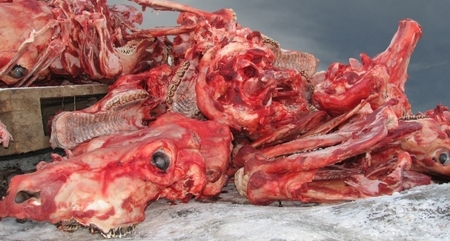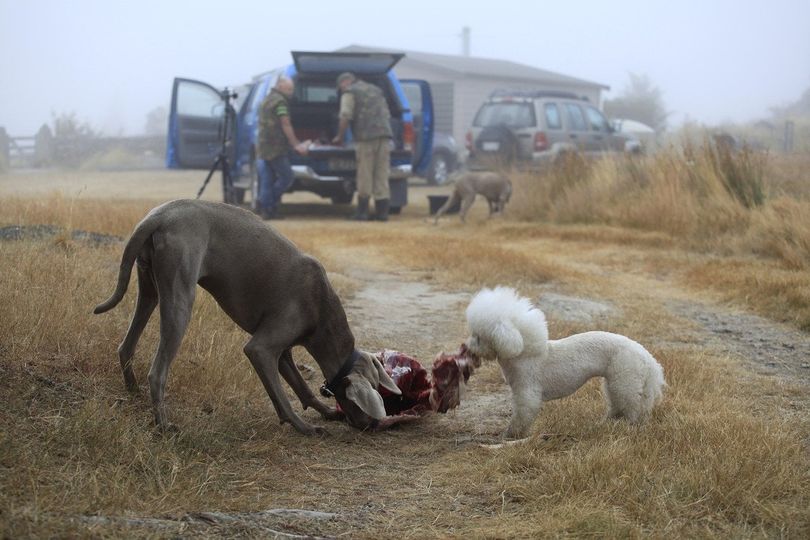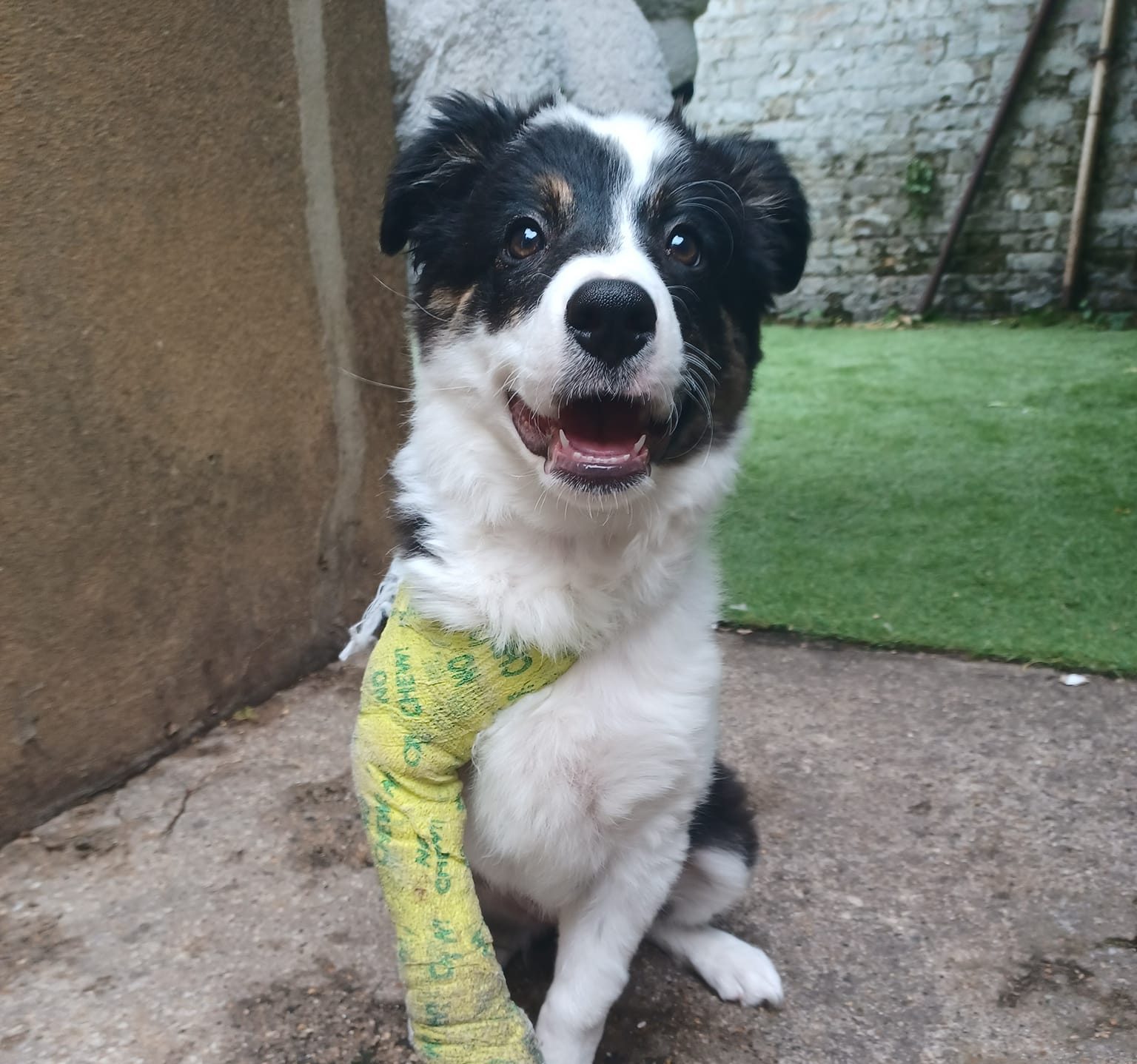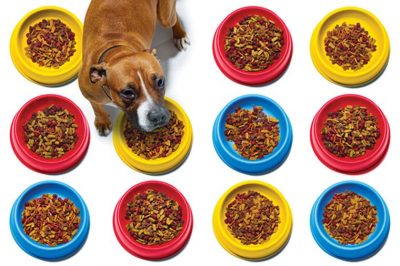Are by-products bad?

If you search the web about by-products as part of a canine or feline diet, you’ll find reams of negative information which can be summarised as “Do not feed your pet by-products”.
This is misleading.
By-products aren’t bad for our pets! Kidneys, liver, brains, and so forth, are all “by-products” and provide vital nutrients which can’t be sourced from muscle meats. This is something many raw-feeders fail to realise.

By-products ~ Sorry for the visual, but this highlights the kind of stuff that goes into pet food. A dog or cat in the wild would have no issues chowing down on such a gruesome platter, but the problem with by-products in pet food is the nutritious by-products have already been removed.
The real problem with by-products in a pet food is what those by-products actually are. It’s what’s left over at the very end of the chain after anything which can be sold for human consumption is extracted. What we’re talking about here is waste from the “human consumption” factory thrown into a bin marked “Pet Food Only” (usually inclusive of other general waste from floor staff) which then gets denaturised and sent off to the kibble factory.






Have you visited AAFCO website? Please back-up your statement with aquality resources.
http://talkspetfood.aafco.org/byproducts
Hi Catherine, sorry for the delay in replying.
Are you suggesting the AAFCO website is a quality resource?
Can you recommend quality resources? I’m afraid I can’t. Even if you were to search Google for studies (i.e. using “site:edu” to filter results to universities) you will find research which relates to website opinions, corporate influence, speculation, and hearsay.
For example, I just searched for “research corn dog food site:edu”) and read the first university research study – A study of the Nutritional Effect of Grains in the Diet of a Dog (http://digitalcommons.library.umaine.edu/cgi/viewcontent.cgi?article=1181&context=honors). The report states high protein/high fat foods are damaging because the kidneys can be affected.
If you research the effects of protein on a canine you’ll find very scant research. It was a conclusion based on research on rats about a century ago. Rats are not canines. That makes the basis of the entire study a farce. Regardless of that, the study does not account for the effects of high-carbohydrate diets on a canine, or even what a fundamental canine diet would consist of. It doesn’t actually account for much, it’s very blinkered.
The problem is, for many people, that research can be read and believed due to being a “quality resource”. Is it a quality resource? Nope.
Hi, if no one can find if corn, wheat or soy are bad for canine’s health, then I will only see them as controversial ingredients.
If I have some topics that I want to find out answers from, I will usually do some search on Google Scholar. (The answers I got were quite accurate I found.) I will probably need to do the same this time too. It will be time consuming. I will let you know when I find out some useful information.
You mentioned that people can choose to believe or not when they read something. This applies to narrative reviews which can be very biased and considered as low quality resource.
For my field, clinical trials are conducted to test if medications are having effects on individuals. For example, measure change in blood pressure or heart attack frequencies and compare difference in outcomes in people who take blood pressure medications versus the ones who take placebo pills. If numerous large high quality studies consistently show the same trend, would you still choose to not believing it?
Hi Catherine, if you can find solid evidence of the effects of corn, wheat, and soy on dogs then by all means pass it my way. Corporate manufacturers release scientific studies all the time, but seemingly if it only suits them to do so or it’s worded in a way which is convincing.
From studies I’ve read it would seem corn protein can be digested sufficiently by a dog, but we also know it doesn’t contain all necessary amino acids, so saying a dog can digest (and benefit from) corn may be true, but can they sustain health over a long period?
It’s not all about whether a grain is good or bad for a dog. A grain might be good for a dog, but is the grain of a sufficient quality? Wheat is a problematic grain and many dogs are allergic to dog foods containing wheat. Is it because the wheat is poor quality, or is it inclusive of mites? If properly processed corn can be scientifically proven to offer a dog nutrition, how do we know the quality of corn in a dog food is sufficient?
Pet nutrition as a whole is grossly overlooked, and I agree with you there needs to be more unbiased scientific research and evidence.
http://truthaboutpetfood.com/what-consumers-are-not-told-about-pet-food-ingredients/
There’s also this it requires you to pay $110 a year to access, it should be free but it’s not.
Susan pays for it so we as consumers can see it for free as should be our right. But like I said they don’t care, your money however they love.
AAFCO is now potentially owned by Purina, they’ve decided to kick Susan off their team because she cared and they didn’t, she wanted pet feed to be labelled as such and pet food to be labelled as such, however her problem was not recording what they agreed on and decided against her offer and said they never made such a claim, pays to take note and voice of everything these days.
They don’t care nor do they want your pets to eat good food, you have to do that no one else will help you.
I’m pretty sure she was even kicked out of one venue when they were speaking about the stuff they speak about, she overheard one guy asking the other “which one is she” apparently there’s a lot of people like her trying to get them to change the laws.
https://truthaboutpetfood.com/is-fda-and-aafco-working-for-purina-now/
So as a rule of thumb I wouldn’t trust them anymore, well I don’t anyways.
I did not know who Susan is. How do I know that she did not write all these articles to bad mouth her ex-employer because she got fired for other reasons? I feel that we are going off the topic if we put too much effort investigating what happened to Susan.
How do you choose your pet food? I want to choose mine based on high quality evidence. If someone says corn or wheat or by products are bad for the dogs without anything to support their statement, I can only think these ingredients are controversial.
She writes to tell us what’s going on with the pet food industry and I doubt she can bad mouth her employees too much as she’s had death threats from them and they are more then equipped to cause harm to her even if it’s not death.
Her news articles aren’t biased their the only ones I actually believe, 6 years of research shows me that most of the other ones are just fake bs conjured up by Purina or Mars because they can.
I choose my foods based on my research and my future job in pet nutrition, holistic that is and I’m also interested in homeopathy but after looking at a holistic vets website not too far from where we live, she states on her bio that she needed to go to England to learn it and that’s a problem, it has to be within Australia preferably Sydney, or my mum won’t let me do it. She’s very protective which is fine but learning anything that’s not available in our hometown becomes impossible.
In saying that I feed/fed K9 Natural Venison when it was still available as a freeze dried product, now I use the cans in place of that.
Ziwipeak both the Venison dried and the entire variety of cans, pet warehouse allows me to buy 1 can at a time so instead of a slab of 1 flavour I buy almost a slab of several.
FrontierPets chicken the rest is too fat.
I tried a lot of kibbles, Rusty did well on a lot of them, some cured his tear stains completely, but recently with watching the pet cancer series I decided kibble didn’t have a place in Rusty’s diet and with the new emu oil/coconut oil treats I could cure his tear stains without the need of the kibble.
Angel she still gets kibble, Applaws I’d rather not spend a fortune on her kibble wise because she eats pretty poorly and prefers cooked chicken, turkey or other meat or Ziwipeak.
There is a lab overseas someplace I have terrible memory of overseas country names sometimes but it’s called DogRisk they did a test of kibble vs raw and found that raw dogs were much healthier, but because the series is long over I don’t think there’s a place you could watch it for free.
Pet fooled was good but compared to the cancer series it was pretty bland in explaining things, specially since I didn’t actually learn anything new.
DogRisk are actually asking for donations currently for another test they want to run a more in depth one I think, they don’t have any English website so it’s hard to know what they’ll be testing for exactly, but I guess once they have the funds we will find out.
And actually what that website can give you the truth about pet foods one is how much AAFCO lies about definitions, how they break state laws and how the state can’t be damned doing anything about the laws they break, their likely paying them to keep quiet I mean what other reason would they have to not sue them or shut them down.
I don’t know who Susan is. I don’t think news articles are used during science based research. You mentioned you did a lot of research. What sources did you use?
My original intention of asking questions were because the writer seems to really dislike corn, wheat, soy and by products. I want to see if high quality research paper can support their statement. I have not seen any of them so far. I can only conclude these ingredients mentioned are controversial, but have not been proven they are bad for canine’s health yet.
I had to post that doctor called me, but in terms of your paper until DogRisk or someone owning the cancer series posts something online for free, there probably isn’t one.
And although the series was worth the money they were asking for it, I didn’t buy it.
Well you know you can look her up right? you keep telling me you don’t know so why don’t you do some research of your own on the topic of who she is.
DogRisk tested one of Purina’s lower end foods one with a lot of corn and wheat in it probably soy too, remembering every ingredient list is impossible there’s over 400 companies each with various formulations.
They tested that food against raw and tried it 4 different ways, once dogs were given dry their numbers went up, even if it was a raw fed dog from puppy to whatever age they did the test.
I don’t think there’s very much research material outside of the internet these days, I mean we’re in an age where you can find anything you need and a lot that you don’t need, iPads are so cool, I found my nerve issue online no one knew what it was, a lot thought I was making it up, an operation when I had no choice the pain got that bad confirmed I had pudendal nerve compression because of the scarring all along the nerve.
The problem however was no one would tell me this and it’s so simple to give a diagnosis like Veronika you have pudendal neuralgia instead of I don’t know, but when I went to see him again after looking it up I was like do I have this? and he said yes … *facepalm* he knew all along just decided I wasn’t worth telling.
9 years of this problem by the way, plenty of time to I dunno diagnose me.
Anyways huge amount of websites, plenty of peoples experiences, Dr Becker, Rodney Habib, Susan Thixton, dog food advisor (full of scum bags) and pet food websites probably every single one of them, my friend Susan she researches as well, pet food reviews to a small degree, Jan the vet we see.
So on and so forth, you can’t really get any other material unless you buy it from somewhere and then you don’t even know if what you paid for has any actual evidence or just made up thoughts.
You have to pick through a lot, there’s so much misinformation out there it’s crazy, that’s why it took so long to learn everything, I made a lot of mistakes early on costing a lot of vet visits for Rusty but you learn as you go along. What’s make belief and what’s real. Essentially whose in it for the money and whose not. Still learning though everyday. I wonder how much of the holistic nutrition course I know and how much is left to learn.